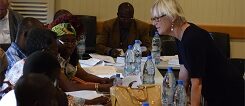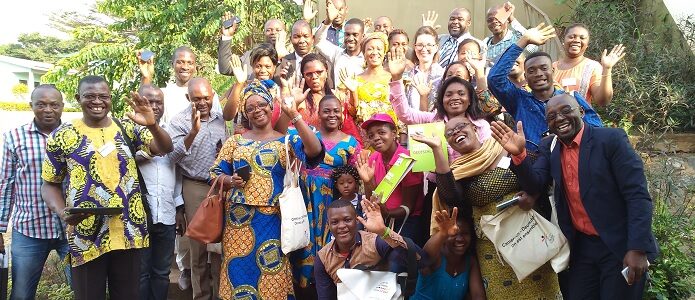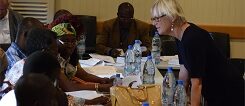Conceive natural science through experiments—teachers training at Bafoussam and Yaounde
The Yaounde Goethe-Institut educative cooperation and the University of Bielefeld have organised on the 27th—28th February 2018 at Bafoussam and on the 2nd—3rd march 2018 at Yaounde two training seminars. Prof. Gisela Lück trained sciences teachers of the first cycle under the theme ‘‘conceive natural science through experiments’’
Which are the suitable materials for this experiments?
 Prof. Lück© Goethe-Institut Kamerun
The Bielefeld university didactic chemistry professor and teaching pioneer of natural sciences oriented toward competences Professor Lück, has taught to the 40 participants how to enthuse the children and the teenagers through experiments on scientific questions. "These do not require expensive and toxic chemicals - the phenomena of the immediate environment of the children and the young people become famous through common materials such as water, oil, salt, sugar, ink, powder with dough or eggs" declared the Prof. Lück. Why does sugar dissolve more quickly in water than salt and why we can be happy to do it? - Why are eggs oval and spread and their shells so strong? How can we make visible that the black colour consists of several colours and to inflate a ball without blowing inside? - - What seems trivial turns out to be a higher chemistry, what is so easy to illustrate by experimenting with cheap and accessible materials, as the participants noted with surprise. "It is in fact experiments which we can make here in our great classes and with little budget", judges a teacher of Yaounde.
Prof. Lück© Goethe-Institut Kamerun
The Bielefeld university didactic chemistry professor and teaching pioneer of natural sciences oriented toward competences Professor Lück, has taught to the 40 participants how to enthuse the children and the teenagers through experiments on scientific questions. "These do not require expensive and toxic chemicals - the phenomena of the immediate environment of the children and the young people become famous through common materials such as water, oil, salt, sugar, ink, powder with dough or eggs" declared the Prof. Lück. Why does sugar dissolve more quickly in water than salt and why we can be happy to do it? - Why are eggs oval and spread and their shells so strong? How can we make visible that the black colour consists of several colours and to inflate a ball without blowing inside? - - What seems trivial turns out to be a higher chemistry, what is so easy to illustrate by experimenting with cheap and accessible materials, as the participants noted with surprise. "It is in fact experiments which we can make here in our great classes and with little budget", judges a teacher of Yaounde.
Reflection on the conception of the lesson
In sequences of half an hour, experiments were made, hypotheses were formulated and questions were raised and estimated under perspectives. Professor Lück showed how to explain to the young children the difference between the structure of salt and that of sugar: e.g. by a plan of people forming an arm in arm shield (salt) and another plan of people forming a stretched out arms shield (sugar). Through this illustration the chemistry is made accessible to the youngest and in the superiour classes, the chemical formulae can be introduced with a bigger complexity.
Besides the experiments and besides their reflection, Prof. Lück also spoke of the learning psychology, the cognitive sciences and about advantages of Storytelling in sciences teaching. „What arouses our emotional interest has a stronger effect on us, and results in a good learning. We should also take it into account during the transmission of the scientific contents of learning ", explained Prof. Lück.
The experiment protein-alcohol had the strongest effect on the participants. „If we think that the protein is here our brain ", explains Prof. Lück, " and here we add some alcohol "- Here we are, the protein is stopped. Thus, the illustration of the (irreversible) denaturation of the intellectual cells under alcohol influence.
To teach science in a competent and resolved way
After two days of varied training with numerous experiments, discussions and reflections, the participants hope for a continuation. „We experimented for the first time, to what extent it is more stimulating to raise questions and to discuss it out among one another through experiments.’’It was brilliant ", declared a participant. Another participant praised the training in these terms: „Having adopted the teaching by skills in our programs, we had so much theoretical training course. But it is only during these two days workshops with practical experiences that we realised what means competence orientation and that it is not a mythical science as that has always been theoritically”.
These two experimental trainings, which were organised in association with the Goethe Institute, the University of Bielefeld and the Cameroon Ministry of Secondary educations and were supported by the Marga and Kurt Möllgaard-foundation, will continue in the next two years in a more widened way. The purpose of the training is to help the teachers to incite the children and the young people to discover good learning in the exact sciences and to authorise them to solve their own problems on a daily basis.
Which are the suitable materials for this experiments?
 Prof. Lück© Goethe-Institut Kamerun
The Bielefeld university didactic chemistry professor and teaching pioneer of natural sciences oriented toward competences Professor Lück, has taught to the 40 participants how to enthuse the children and the teenagers through experiments on scientific questions. "These do not require expensive and toxic chemicals - the phenomena of the immediate environment of the children and the young people become famous through common materials such as water, oil, salt, sugar, ink, powder with dough or eggs" declared the Prof. Lück. Why does sugar dissolve more quickly in water than salt and why we can be happy to do it? - Why are eggs oval and spread and their shells so strong? How can we make visible that the black colour consists of several colours and to inflate a ball without blowing inside? - - What seems trivial turns out to be a higher chemistry, what is so easy to illustrate by experimenting with cheap and accessible materials, as the participants noted with surprise. "It is in fact experiments which we can make here in our great classes and with little budget", judges a teacher of Yaounde.
Prof. Lück© Goethe-Institut Kamerun
The Bielefeld university didactic chemistry professor and teaching pioneer of natural sciences oriented toward competences Professor Lück, has taught to the 40 participants how to enthuse the children and the teenagers through experiments on scientific questions. "These do not require expensive and toxic chemicals - the phenomena of the immediate environment of the children and the young people become famous through common materials such as water, oil, salt, sugar, ink, powder with dough or eggs" declared the Prof. Lück. Why does sugar dissolve more quickly in water than salt and why we can be happy to do it? - Why are eggs oval and spread and their shells so strong? How can we make visible that the black colour consists of several colours and to inflate a ball without blowing inside? - - What seems trivial turns out to be a higher chemistry, what is so easy to illustrate by experimenting with cheap and accessible materials, as the participants noted with surprise. "It is in fact experiments which we can make here in our great classes and with little budget", judges a teacher of Yaounde.Reflection on the conception of the lesson
In sequences of half an hour, experiments were made, hypotheses were formulated and questions were raised and estimated under perspectives. Professor Lück showed how to explain to the young children the difference between the structure of salt and that of sugar: e.g. by a plan of people forming an arm in arm shield (salt) and another plan of people forming a stretched out arms shield (sugar). Through this illustration the chemistry is made accessible to the youngest and in the superiour classes, the chemical formulae can be introduced with a bigger complexity.
Besides the experiments and besides their reflection, Prof. Lück also spoke of the learning psychology, the cognitive sciences and about advantages of Storytelling in sciences teaching. „What arouses our emotional interest has a stronger effect on us, and results in a good learning. We should also take it into account during the transmission of the scientific contents of learning ", explained Prof. Lück.
The experiment protein-alcohol had the strongest effect on the participants. „If we think that the protein is here our brain ", explains Prof. Lück, " and here we add some alcohol "- Here we are, the protein is stopped. Thus, the illustration of the (irreversible) denaturation of the intellectual cells under alcohol influence.
To teach science in a competent and resolved way
After two days of varied training with numerous experiments, discussions and reflections, the participants hope for a continuation. „We experimented for the first time, to what extent it is more stimulating to raise questions and to discuss it out among one another through experiments.’’It was brilliant ", declared a participant. Another participant praised the training in these terms: „Having adopted the teaching by skills in our programs, we had so much theoretical training course. But it is only during these two days workshops with practical experiences that we realised what means competence orientation and that it is not a mythical science as that has always been theoritically”.
These two experimental trainings, which were organised in association with the Goethe Institute, the University of Bielefeld and the Cameroon Ministry of Secondary educations and were supported by the Marga and Kurt Möllgaard-foundation, will continue in the next two years in a more widened way. The purpose of the training is to help the teachers to incite the children and the young people to discover good learning in the exact sciences and to authorise them to solve their own problems on a daily basis.

